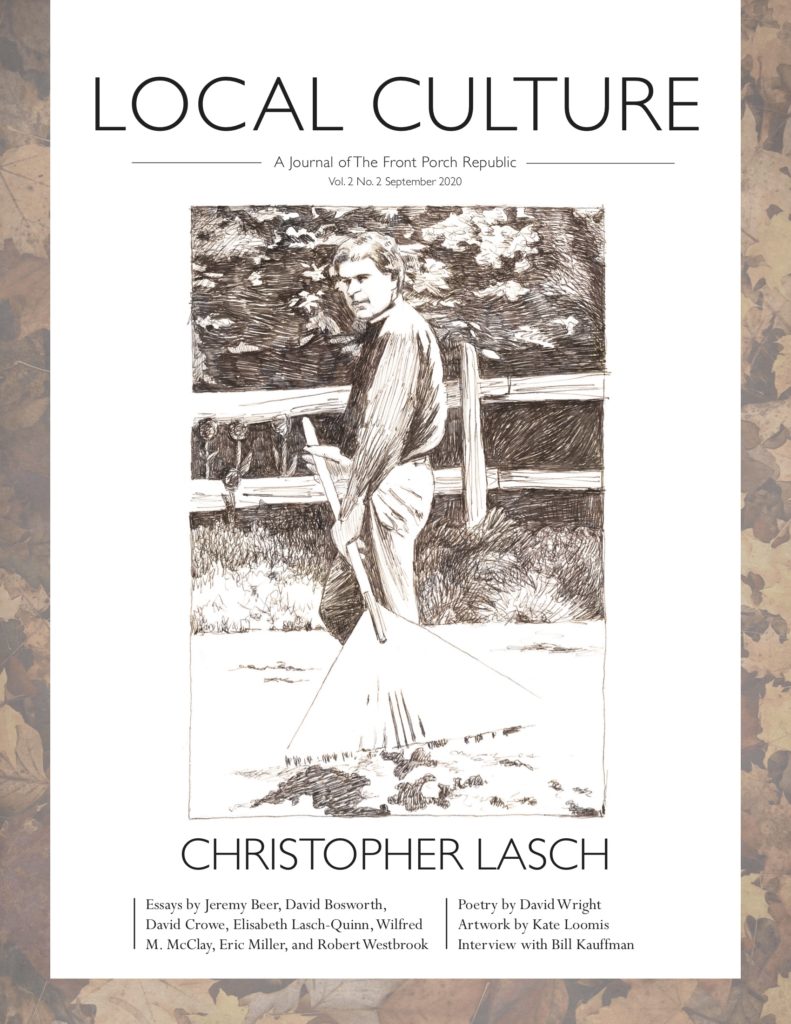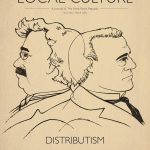Editor’s Note: FPR’s tendency over the years has been to keep itself at least a little above, rather than immerse itself in, the news cycle–and certainly not to sink below it. But there have been occasions when the writers here have responded to current events, sometimes in direct response to calls from readers to do so.
This reprinting of Jeremy Beer’s essay “Limits, Risk Aversion, and the Technocracy” from Local Culture Vol. 2, No. 2 (September 2020) is an instance of this direct response. (One subscriber to the journal suggested immediately after its publication that Dr. Beer’s essay be made more widely available.) Although the essay was originally written last May, we believe its insights concerning the technocratic culture made particularly manifest by the response to COVID-19 remain relevant. We hope it addresses some of our readers’ interests, and we herewith reprint it without further comment.
Phoenix, AZ. The concept of limits—specifically, modern society’s hostility thereto—formed the central theme of Christopher Lasch’s later writings. Lasch argued that capitalism, by provoking the expansion of appetite and by exploiting nature in every way possible in order to satiate that appetite, taught us to conceive of economic growth as unlimited in principle. Liberalism, likewise, taught us to see our very selves as sites of creative experimentation, a process that was also, in principle, unlimited—or, rather, limited only by the ever-receding (thanks to capitalism!) horizon of mortality. Lasch contended that the advocates of liberalism and capitalism had therefore naturally combined forces to attack those traditional institutions and ideas that fostered notions of self- and cultural limitation. Religion and the family were their prime targets—implicitly (mostly) in the case of capitalism, and explicitly (mostly) in the case of liberalism.
Lasch died in 1994. A generation has passed. Lasch is still read and cited widely on both the Right and the Left, never with more urgency than since the election of Donald Trump to the United States presidency. Most of that commentary has focused on Lasch’s late-life promotion of populism as a hopeful political path. Populism is a political philosophy whose time may or may not have come. But what about Lasch’s analysis of limits? In what ways might it need to be modified or elaborated today? I have in mind two contemporary cultural developments, the rise of technocracy and our extreme aversion to risk, that seem to challenge certain aspects of Lasch’s thinking.
Let’s begin by considering the sentence “We must follow the science.” It is one we have heard, in various forms, repeatedly since about the middle of March 2020 via the various propaganda platforms that saturate our lives: the electronic billboards, the websites, the TV ads, the Tweets and Instagram posts. No sentence better captures the core convictions and commitments of our well-educated, well-heeled, and well-regarded.
Think of the parallel commands never heard. No one who is today in a position of cultural authority ever says, “We must follow our guts.” No one says, “We must follow tradition.” No one says, “We must follow our religious leaders.” No one says, “We must follow the poets.” No one says, “We must follow what the majority decides.” No one says, “We must follow those who have displayed wisdom.”
Importantly, no one in a position of cultural authority even says, “We must follow no one but ourselves. No one can legitimately set limits on our behavior!”
No, the widely held, seemingly unchallengeable cultural belief is: We must follow the science.

There is much meaning packed inside this simple command. Note that it has a comprehensive application: the “we” to which its utterer refers—during a pandemic and at virtually all other times—is global in scope. It excludes no one. Then there is the imperative mood. This is not a mere suggestion: we must do it. There is the charge to bow to the one source of instruction, Science, that looms above all others as if a god. And there is the implicit reminder that we who are not this god’s high priests have a moral obligation to bend our wills and ways to the dictates of those blessed persons who are able to hear and interpret the god’s sayings.
Such an age as ours, in which the propriety of such a command is taken for granted and rarely challenged, is certainly not one in which all limits are viewed with suspicion. Rather, it is an age by definition technocratic. It is one in which technologists—experts at translating science into practice—are in charge.
Technocracy poses peculiar problems, among them the deflation of spiritedness through a heavy emphasis on risk mitigation, an emphasis that flattens horizons and drains life of much of its meaning and joy. Technocracy also produces paradoxes and contradictions: while technocrats might say that there are and ought to be no natural limits on human behavior, and that by overcoming nature’s tyranny their rule therefore expands the scope of human freedom, the technocratic regime is in practice shot through with injunctions, taboos, and prohibitions that hem in human liberty ever more tightly.
Liberal technocrats deal with this contradiction by the simple, and surprisingly successful, expedient of giving every injunction, taboo, and prohibition the name of freedom. As we shall see, this ironic and disguised posture makes our dilemma difficult to overcome.
What do we mean by technocracy? In his highly illuminating The Tyranny of Liberalism, James Kalb defines technocracy as “the attempt to order human life solely by reference to concepts modeled on those of formal logic, bureaucracy, market economics, and the modern natural sciences.” “Solely” is the key word here. In a technocracy those irrational or subrational principles of order derived—or purported to derive—from theological conviction, longstanding tradition, or local custom are considered illegitimate. As time and circumstances allow they are derided and discarded by those holding power.
Kalb’s definition helps us see the intrinsic connection between technocracy and liberalism: both employ formal rules and an Enlightenment conception of reason to subvert the power of church, family, and local community. Technocracy might be said to be liberalism’s natural institutional expression. Its victory means the victory of “managers, experts, educators, media organizations, and rationally organized bureaucratic and commercial interests,” writes Kalb, all of whom, because they owe to liberal principles their rise and positions, naturally use their platforms actively to “promote liberal understandings” of the world.
The rise of a technocratic sensibility and power structure leads to the destruction of cultural differences and particularity, since difference and particularity stand in the way of centralized technocratic management. Kalb points out that the existential flattening that is the result of this bureaucratic war on difference has finally led to a culture in which any mode of discourse, or any way of being-in-the-world, that is non-technocratic seems nonsensical or willfully obtuse. The debate surrounding the coronavirus pandemic has proven the validity of this insight. No argument about how a person, locality, state, or any other body should respond to the crisis is taken seriously unless it refers to data, scientists, experts, and so forth. In short, if you refuse to communicate in the technocratic idiom or to live by technocratic rules, you may be considered a harmless eccentric or a dangerous rebel, but you cannot be considered a legitimate interlocutor in the cultural conversation.
Those who seek to resist technocracy therefore usually feel compelled to translate their policy goals and arguments into technocratic language. As Kalb laments, “Even common sense must put on technocratic garb to get a hearing: one cannot speak of the commonest and most evident features of daily life today without citing social science studies.” If, out of an abundance of persistence, you nevertheless try to appeal to common sense in defense of a culturally disfavored conclusion or point of view, you will have cited against you social science studies showing how “common sense” approaches to life are permeated by a range of cognitive-, racial-, class-, and gender-based biases. Common sense cannot be trusted! The implication is that we must leave the thinking to properly trained and credentialed technocrats who have the tools and training to overcome their biases. Thus do the academic purveyors of pop psychology shore up technocracy’s foundations.
It is a hard nut to crack. “So great is the power of modern technocracy, and so close is the connection between liberalism and power,” writes Kalb, “that liberalism comes to seem irresistible, almost a law of nature.”
All classes favor it. Political elites like what increases their power, the rich what secures and increases their wealth, experts what makes expertise the key to social functioning, idealists what conforms social functions to abstract rational principles, social climbers what makes them respectable, and almost everyone what makes for comfort. Besides, liberalism and technocracy present an illusion of limitless choice that allows us to deny life’s limitations. The scientific conquest of nature, with which liberalism associates itself through its embrace of scientism, has been spectacularly successful, and people expect methods that solve some problems so well to solve all. Those methods have given us unprecedented physical power and economic abundance. Why should they not solve all other problems and give us whatever we want?
Why, indeed? One might read Ross Douthat’s The Decadent Society as an extended consideration of this question. In his wide-ranging discussion of economics, technology, the arts, and other sectors of our culture, Douthat argues that ours is an age not of dynamism, but of torpor. He makes a cogent case that over the last fifty years there has been much less fundamental change in the way we live than there has been in the half-century preceding those years. And while he does not necessarily desire more creative destruction, he does wonder what this state of affairs reveals about our souls.
Douthat never puts it in these words, but the death of spirit is arguably the thread that ties together his thoughts. Page after page, chapter after chapter, Douthat lucidly and judiciously documents how spiritedness has not only diminished but become suspect. He shows how we have oriented our institutions around the taming, controlling, and diminution of spiritedness. The result is that we are increasingly fearful, if not terrified, in the face of risk—and therefore call on technocratic elites to mitigate it for us.
In defense of his thesis Douthat recurs to James Poulos’s “pink police state.” Under such a regime the fundamental binary along which social authorities operate is not public/private, as in liberal or constitutional thought, but rather healthy/diseased or safe/dangerous. “The civil liberties to be protected and encouraged in this new order,” Douthat explains, “are the liberties of pleasure and consumption, and the freedom to be ‘safe’—broadly defined—from threats to bodily integrity, personal expression, and psychological well-being.” The authors of the Bill of Rights have seen their conception of freedom turned on its head. For if we are to be “free to be safe,” then the “liberties to be limited are the liberties that enable resistance, both personal and political: the freedoms of religion and speech, and the ability to participate fully in the culture without sacrificing your privacy, without having your life be a kind of open book.”
Needless to say, restricting the freedom to resist in the name of a more fundamental freedom to be safe requires a powerful effort to diminish and penalize thymos.
Douthat also points out that Francis Fukuyama, too often derided over the last thirty years for his end-of-history thesis, was more prescient than some of his critics admit. In Fukuyama’s conception the end of history didn’t mean that things wouldn’t happen anymore, but rather that the kind of “daring, courage, imagination, and idealism” that had been called forth by the struggle between capitalism and communism would “be replaced by economic calculation, the endless solving of technical problems, environmental concerns, and the satisfaction of sophisticated consumer demands. In the posthistorical period there will be neither art nor philosophy, just the perpetual caretaking of the museum of human history.” (Perhaps the only word that does not ring true in that depressing quotation is the word “caretaking”; “rewriting” would be better.)
The end of history, in other words, is best understood as a technocratic goal rather than a prediction. For if the purpose of the state is to keep us healthy and safe rather than to preserve a zone of private, free action (let alone to promote virtue as understood by institutions anterior to and more fundamental than the state), and if we need no longer wage an existential struggle over radically different visions of society and the individual, then it follows that our politics must change. The riskiness, messiness, and inefficiency of democracy ought reasonably to be replaced by the relative safety, orderliness, and efficiency of technocracy. A paradox emerges. A philosophy, liberalism, premised on removing limits to human activity generates a regime, technocracy, that limits human activity in new and ever more profound ways.
Technocracy and risk-aversion were not words much used by Christopher Lasch. But his late writings nevertheless illuminate the dynamics underlying and arising from the rise of the technocratic ideal. They also show just how much our cultural situation really has changed over the space of a generation, Douthat’s evidence for our stasis notwithstanding. For as vital as his insights were and remain, neither Lasch’s affirmation that we live in a no-limits anti-culture—an idea first put forth by Philip Rieff—nor his implicit diagnosis that hyper-spiritedness lies at the core of our dilemmas can be sustained.
Consider the idea that we now or soon will live in an anti-culture. In The Triumph of the Therapeutic Rieff conceived of culture as a sort of teeter-totter, dependent for its very existence upon there being a workable, reasonable area of “remissive flux” between what he called “interdicts”—unwritten rules specifying what is and isn’t allowed—and “transgressions”—acts that violate those rules. All cultures allow for transgressions at certain times and in certain places. Rieff used the term remission to refer to those allowances. He used the term taboo to refer to norms or rules that may never be defensibly violated.
Every culture, wrote Rieff, is characterized by these features: interdicts, remissions, transgressions, and taboos. Whether we are talking about Swedish culture in the 1700s or Russian culture in the 1400s or Greek culture in the 100s or Egyptian culture in the time of the pharaohs, we will always find these features. But, so Rieff thought by the late 1960s, our time is different. Our time is characterized by a revolutionary, profoundly anti-historical spirit that calls into question all authority and hence undermines the very possibility of culture. For the first time cultural elites are actively and joyously subverting the very idea of cultural norms.
The result of this process, Rieff believed, would be the creation of true barbarians, which had never actually existed before. Barbarism would be a truly modern achievement! The barbaric world to come, he prophesied, would recognize nothing sacred, no moralities, no religions. It would stand against all interdicts, all authority outside the self. It would be, quite literally, an anti-culture.
For a generation or so this sort of anti-culture has existed in the imaginations of more traditional commentators, including mine. It may even be said to exist in the imaginations of liberals and radicals. For a while it seemed that such a world was on the horizon and that it was only a matter of time until it came fully into being. But that is not what happened.
Lasch predicted its failure. He agreed with Rieff’s basic analysis, but he also thought that a fully remissive anti-culture was impossible to maintain, that “our remissive elites will have to rediscover the principle of limitation.” Alas, whereas Lasch hoped that this rediscovery would mean an end to the “modern project,” it seems only to have deepened its hold on us.
Consider: If an anti-culture is one in which anything goes, if it is a libertarian world of live- and-let-live,you-do-your-thing-and-I’ll-do- mine, a world in which there is no transpersonal authority that sets limits to human behavior and thought or that defines interdicts and their remissions, a world that is dispersive and centrifugal—if that is what an anti-culture would look like, then it is abundantly clear that we do not live in such a world.
Quite the contrary. As the coronavirus pandemic has made painfully obvious, we live in a world that is highly and ceaselessly policed by social authorities. Those authorities include the usual suspects: media figures, journalists, corporate leaders, politicians, scientists, academics. But there are new ones, too: large-platformed celebrities, bloggers, social media gatekeepers. Indeed, the strictures of these authorities are now ruthlessly enforced by men and women—persons whose social aspirations cause them to identify with elite thinking—in comment boxes and Instagram posts across the world.
In a word, there is still powerful authority lodged in various cultural institutions, persons, roles, and modes or styles of discourse. And it is very much an authority that sets limits on human behavior. But something has changed, for what we might call the New Authority is an obscured, masked, reversed authority that denies its own nature. In speech the remissive regime remains in place, even as in practice new injunctions and taboos are constantly put in place. As a result, most of those who wield the New Authority and pay obeisance to it do not think they are wielding or obeying authority, but only the dictates of reason or compassion or justice.
Indeed, to express, participate, or get hold of this New Authority for yourself, you must first of all not think of yourself as exercising authority. Dominance is the new deviance, as Jonathan Haidt has written. Authority today therefore springs ironically out of victimhood claims. And victimhood springs out of being oppressed by authority—or, rather, by what was once perceived as authority but of course really is no longer. The authority of victimhood can be and is claimed the moment one is faced with a cultural deviant who has the temerity or ignorance to express an absolute judgment, rooted in traditional cultural sources, in an unironic, direct way.
The new ironic style of wielding cultural authority is meant to protect our freedom, of course. But the husk of the old word has been filled with a new meaning, which is something like Douthat’s “freedom to be safe.” Yet since it is wielded in the service of individual freedom, those who wield the New Authority are typically shielded from having to think about it as authority. They are, on the contrary, according to their own self-understandings, liberators, or at least people who are aligned with the forces of liberation.
The edicts and ideals promulgated by the New Authorities are as highly internalized, and as highly integrated, psychologically and sociologically, as the old authorities ever were. True, they are not highly internalized by everyone, but they are internalized by a majority of the population and certainly by the vast majority of our cultural elites. Indeed, the New Authorities arguably exercise even more influence, and have even more psychic power, precisely because they do not present themselves as authorities and are not perceived by those who have internalized their edicts as authorities.
Now, no one will simply stand up and say there is a new sheriff in town. Jonathan Haidt’s work suggests why. In The Righteous Mind Haidt argues that conservatives are more complex in their moral reasoning than liberals are, that there are more dimensions to their reasoning, and that one of those dimensions is … authority. Conservatives will reason as to the rightness or wrongness of an action by appealing to authority, whereas liberals will find such appeals specious. Thus, even as liberals (unsurprisingly) have cultural authority in our modern liberal society, they cannot admit that they do. They must always cloak their authority in the clothing of rebellion and subversion, and this turns out to be a huge advantage for retaining their authority: authority is now harder to identify, harder to challenge, and easier to internalize. We are surrounded by limits, but those who set them don’t have to own up to that fact.
Common men and women may not be able to articulate this dynamic, but many of them feel it, and they feel it in that peculiarly oppressive way in which being asked to swallow lies always affects us. Lasch understood them.
He understood that the victories achieved by the conservative movement in the 1980s were rooted not so much in racism and jingoism, as the Left liked to believe, but in conservatives’ successful positioning of themselves as a bulwark against the “new class” of elites, a class that, as he said in “What’s Wrong with the Right,” seemed to stand against “the great American middle class: hard-working men and women eager to better themselves, who reject government handouts and ask only a fair chance to prove themselves.” He understood that conservatives offered an attractively “unembarrassed defense of patriotism, ambition, competition, and common sense, long ridiculed by cosmopolitan sophisticates,” and had therefore successfully switched places with the Left in more plausibly being able to say they spoke for the common man.
He understood that the Left had it coming because it had been captured by the new class since World War II and had as a result become entirely comfortable in using “essentially undemocratic means to achieve democratic ends.” The Left portrayed those opposed to its outlook and favored policies as proto-fascists, bigots, and sexists. It celebrated moral decay and family breakdown, seeing these as positive outcomes heralding the birth of a new and more just social order. It operated in bad faith by refusing to call things by their right names, insisting that new domestic living arrangements, for example, were just as entitled to the word “family” as any other. And above all, the new-class Left was committed to the “modern delusion that people can keep all their options open all the time, avoiding any constraints or demands as long as they don’t make any demands of their own or ‘impose their own values’ on others.”
Lasch did not quite understand at the time—no one did—that this delusion, far from encouraging too much risk-taking, would ultimately give birth to the most risk-averse society ever to exist. After all, you can’t keep your options open if you are dead. It was a hard- won working-class insight that, in Lasch’s words, “there are inherent limits on human control over the course of social development, over nature and the body, over the tragic elements in life and history.” But to the new elites this sounded like a counsel of defeat. For a generation they have been mired in projects of self-management aimed at keeping themselves perpetually young, attractive, and—most of all—alive. As Rusty Reno points out, theirs is a utopian ideology, one that depicts “life without its usual ugly defects and stubborn limitations, which is to say life not as it normally is.” But it is clung to so tenaciously that, “infatuated by what they presume to be their power over finitude and misfortune, [elites] are enemies of normal life, which they increasingly see not as normal, but rather as deplorable.”
The fruit of the new elite’s denial of the inevitability of aging, death, and disease is not a straightforward, hyper-spirited attack on nature but rather a hyper-anxious obsession with managing and mitigating risk. What is therefore needed is not a critique of spiritedness, as Lasch was prone to mount in the 1990s as he took aim at capitalism and its defenders, but rather a more fulsome defense of spiritedness, as well as a more biting critique of our pathological aversion to risk. And that means once again defending the sensibilities of the non-elite working classes, where spiritedness remains popular.
The working classes, for good or ill, responded positively to Ronald Reagan, and later to Donald Trump, because of those candidates’ spiritedness. The members of these classes like or tend to like NASCAR, and UFC, and football, and defiant country music, and defiant hip-hop music, and souped-up trucks and Cadillacs and four-wheelers and bars that might get a little rough on a Saturday night. They like church, even if they don’t always go. And they swear by the family, even as they increasingly struggle to maintain healthy ones of their own.
They like all that because they know this life is short and uncertain. They like all that because their technocratic betters don’t. They like all that because it allows them to express, however temporarily and ineffectually, their belief that they haven’t been and won’t be defeated, and that the happiness life offers is most assuredly limited. Lasch was right, in the name of democracy and humanity, to defend them.









5 comments
Martin Schell
A superb essay, Jeremy. Thanks much. Let me share some branching thoughts that arose roughly in the order of your text.
March for Science. Is it really? You mention in passing scientism, which most dictionaries define as “excessive belief in the power of science” but let’s look at “science” itself. One of the two gold sponsors of the Denver March for Science was CBR International:
https://marchforsciencedenver.org/sponsors/
This company appears to be positioned as a collection of experts who can expedite drug approval, something that Big Pharma has been whining about for years: Reduce Regulations, Save Lives! But isn’t safety testing also a form of science? Here’s a 2011 article about that:
https://xconomy.com/national/2011/04/15/why-do-i-love-drug-regulation-simple-it-keeps-us-safe/
More generally, science itself no longer wants to entertain doubts. There is a crisis this century in regard to replication studies that confirm a scientific finding — few scientists want to do them because few journals want to publish them and it’s hard to get funding to “reinvent the wheel” (recall the Theranos scandal).
https://www.enago.com/academy/importance-of-replication-studies/
Risk mitigation. Your essay dovetails with Max Weber, both in terms of materialism (theory of bureaucracy) and spirituality (routinization of charisma). I’m also reminded of Thomas Kuhn’s Structure of Scientific Revolutions and Galbraith’s warning about managers protecting their own position rather than taking risks and innovating the way owners/founders did. I suspect that our society has passed the peak of innovation, evidenced by new models of cars, phones, etc. that add bells and whistles but do little to improve the original innovative functionality.
“Common sense cannot be trusted!” Indeed. This reminds me of E.M. Forster’s prescient 1909 story “The Machine Stops” about a technocratic society which emphasized the slogan “Beware of First-Hand Ideas”:
https://www.ele.uri.edu/faculty/vetter/Other-stuff/The-Machine-Stops.pdf
Economic abundance. A deep irony in the current pandemic panic is that people who are enjoying a modicum of prosperity, especially people who are in the middle class or lower, and especially in poorer countries, have a tendency to get nervous about losing what they have worked to gain. So a low probability disease (1% death rate, if you actually get diagnosed with it) seems like a big risk. But when the global response to that disease is to trash the world economy, those same people no longer feel like they have a materially “good life” worth protecting.
Finally, your phrase “denial of aging, death and disease” precisely mirrors the story of the sheltered life of Prince Siddhartha who one day discovered these three limitations on human existence and began a quest that resulted in him becoming Gautama Buddha. If you think Buddhism is a quietist religion that lacks spiritedness, ask the Rohingya about their experience in Burma.
Anthony Oughton
I am one of the readers who has been making calls for some more direct engagement with what is going on around us, so I am happy to read this well thought through piece. I also enjoyed the comments – first time I’ve seen Fernando Pessoa on this site!
Can anyone say what the general situation is in the US for lockdown etc? In Britain we are back in our houses.
Rob G
Excellent essay that I will be distributing far and wide.
I would note that a parallel argument coming from an economic/political left point of view is that of the Korean-born German philosopher and critic Byung-Chul Han. See his books The Burnout Society, Psychopolitics, and In the Swarm: Digital Prospects. It’s notable that his next two books to be published in English are called Capitalism and the Death Drive (July) and The Palliative Society (August).
From the publisher’s description of the latter:
“Our societies today are characterized by a universal algophobia: a generalized fear of pain. We strive to avoid all painful conditions – even the pain of love is treated as suspect. This algophobia extends into society: less and less space is given to conflicts and controversies that might prompt painful discussions. It takes hold of politics too: politics becomes a palliative politics that is incapable of implementing radical reforms that might be painful, so all we get is more of the same.”
(Note: most of Han’s books are small, generally under 100 pages. They read like long essays, or in certain instances, collections of small essays.)
Chris Ramsey
“There’s something happening here, what it is, ain’t exactly clear…”
This lyric has been coming to mind for me a lot lately. It came to mind this morning as I read Dr Beer’s wonderfully troubling essay.
I turn 60 in a few weeks – helping old people leave this life and helping new people enter. It’s definitely risky business!
Mike Sauter
As Fernando Pessoa said “All is religion”. This is brilliant, Jeremy. Thanks. A masterful work that analyzes this while taking for granted, as almost a starting point, that which you correctly discern as a new, hidden authority “cloaked in rebellion and subversion”, replete with priesthood, is Guido Preparata’s “The Ideology of Tyranny”. I’ve found lately that most people who seem to ‘get’ this have at least some exposure to Rudolf Steiner and have been influenced by his understanding of a certain, modern, ‘flavor’ of evil that is bureaucratic, scientistic technocratic, materialist, intellectual and elitist, and which he calls “Ahrimanic”. He saw Trump’s own, more traditional, flavor as something of an ice-beaker and a decoy for this new, hidden dark and authoritative religion, which follows in its wake. Thanks again.
Comments are closed.